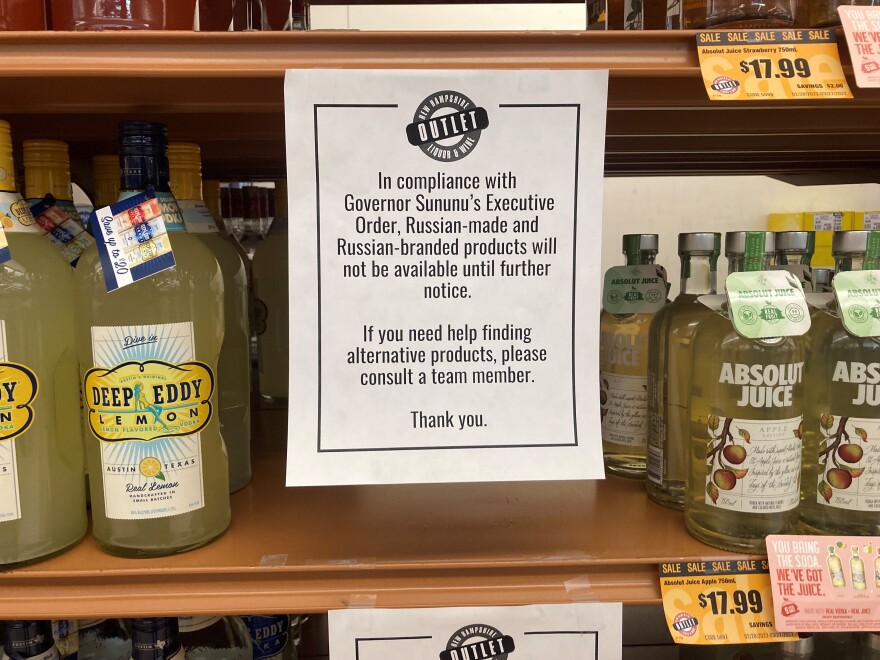Just days after Russian forces breached the Ukrainian border, New Hampshire joined other states in prohibiting “Russian-made” and “Russian-branded” spirits from being sold at state-owned liquor stores.
It was a symbolic move, and one with precedent. In 1983, under a previous governor named Sununu, New Hampshire temporarily banned Soviet-made spirits following the downing of a Korean Air Lines passenger jet that killed 269 people.
“I don’t think removing Russian-branded spirits from New Hampshire shelves is bringing Vladimir Putin to his knees,” Gov. Chris Sununu said this week. But he added that it is a small gesture the state can take to show solidarity with Ukrainians.
But Sununu’s one-page executive order, issued on February 26, doesn't include a definition for what constitutes a “Russian-branded” liquor, prompting at least one major vodka producer, Stoli Group, to mount a PR campaign contending it is being unfairly penalized.

Since the early 2000s, Stoli Group, which manufactures Stolichnaya Vodka along with a variety of flavored spirits, has been based in Latvia. After its founding in the Soviet Union in 1938, the company’s former CEO, Yuri Shefler, moved the firm out of Russia in 2000 as Putin was coming into power. The company has been critical of the regime ever since, according to its current leader and it says it has no current operations in Russia.
“We have represented in effect the resistance movement against Putin for over 20 years,” Damian McKinney, current CEO of the Stoli Group, said Wednesday morning during an interview on New Hampshire Today, hosted by Chris Ryan. He took to the airwaves to plead his case over the state’s decision to ban Stoli products.
According to Stoli officials, New Hampshire is the only state that banned its spirits in response to the Russian incursion. The company said approximately $460,000 worth of inventory was pulled off the shelves. In 2021, Stolichnaya, Stoli’s flagship vodka, was the 25th best-selling spirit in New Hampshire, with customers purchasing 15,752 cases.
“It feels a little bit like friendly fire,” McKinney said.
Visitors to Stoli Group’s website are greeted with a declaration opposing Russia’s actions, along with a link to make a donation to World Central Kitchen, which is providing assistance to Ukrainian citizens. Blue and yellow, the colors of Ukraine's flag, frame the webpage.
“Not one single cent goes anywhere near Putin,” McKinney said.
He added that he has tried to explain the company’s history and position to the governor, including through emails, but hadn’t successfully made his case.

When asked why the product continues to be prohibited in New Hampshire despite its Latvian origins, Sununu pointed to the bottle itself.
“Stoli Vodka has a picture of Russia on it, and it is branded as such,” said Sununu.
The current logo for the Stolichnaya unflavored vodka sold in the United States includes an artist’s rendering of a famous hotel that stood in Moscow until it was razed in 2004, according to the company. The back label alludes to the vodka's wheat coming from Tambov, a region in Russia.
Sununu added that, outside of the company’s CEO, he isn’t aware of anyone complaining about the prohibition.
Stoli Group announced earlier this month that given the confusion over its present location, it has begun to rebrand, including dropping the name Stolichnaya in favor of Stoli.
“If they want to rebrand it, and I think they are looking to do that, I think that’s a great idea,” said Sununu.
But what is considered “Russian-branded” under the state’s executive order appears to remain open to interpretation. For example, the state continues to sell Popov brand vodka, which is made in the United Kingdom. The bottom-shelf spirit’s logo prominently contains an image of Moscow’s St. Basil’s Cathedral, with its famous onion-shaped domes. Taaka, which is manufactured in Kentucky, also has a rendering of the famous Red Square cathedral in its branding.
Smirnoff, the state’s ninth top-selling spirit in 2021, is produced in multiple locations around the world. On its back logo, the brand advertises that it has traveled “from Russia to Poland, Paris to America.” But despite that reference, it remains on New Hampshire liquor store shelves.
The Liquor Commission didn’t respond to a request to explain why those products remain for sale, while Stoli’s vodkas are sidelined.
The other vodkas currently banned include Russian Standard, Hammer & Sickle Vodka, Imperia Russian Vodka, Polugar Rye & Wheat, Aviator Vodka, Kutskova Vodka, and Moskovskaya Vodka.








